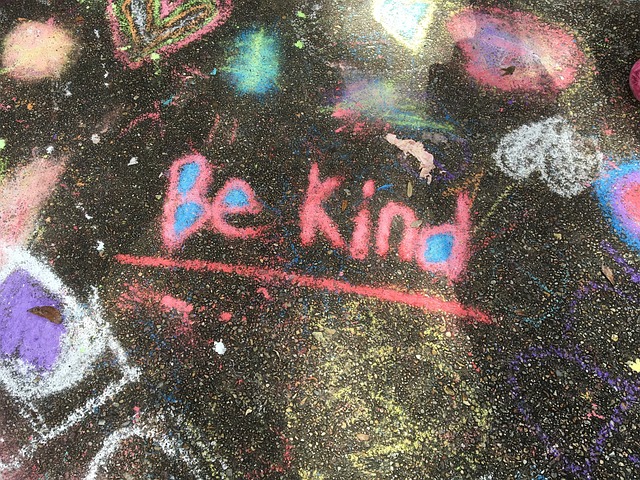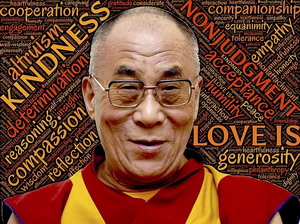 One of my patients asked me to write an article about kindness. Her concept was we would have a better world if everyone simply applied a little more kindness to others in their daily lives. I let that settle into the back of my mind to see what would ferment. On the surface, this seems obvious, but that does not make it true. That just says I have old beliefs that align with this concept. I am often fooled by my old beliefs into accepting stances with life that don’t actually work. I am a very limited being operating in a world that is vastly more complex than I am able to grasp, even though I work night and day to just get a clue.
One of my patients asked me to write an article about kindness. Her concept was we would have a better world if everyone simply applied a little more kindness to others in their daily lives. I let that settle into the back of my mind to see what would ferment. On the surface, this seems obvious, but that does not make it true. That just says I have old beliefs that align with this concept. I am often fooled by my old beliefs into accepting stances with life that don’t actually work. I am a very limited being operating in a world that is vastly more complex than I am able to grasp, even though I work night and day to just get a clue.
 As I was coming home from the office yesterday, my first reflection on the idea of kindness came in as a look at what stops kindness. It is something everyone is taught about either by parents, school, or church. So it is not a foreign idea to us. Yet we see so little of it being practiced day to day. When I ask myself why is this, the subject of self-significance pops up. When you think of the most powerful and important people on the planet today, does the word kind jump to mind? No, it doesn’t. Historically, the more important you were the less kindness you showed. Kindness recognizes a common humanity between you and the person needing kindness. Kindness sees that if circumstances had been different, it might be you that is needing some kindness right now. That awareness, that vulnerability is not a comfortable feeling. We don’t like to feel uncomfortable. We prefer the illusion that we are above those circumstances.
As I was coming home from the office yesterday, my first reflection on the idea of kindness came in as a look at what stops kindness. It is something everyone is taught about either by parents, school, or church. So it is not a foreign idea to us. Yet we see so little of it being practiced day to day. When I ask myself why is this, the subject of self-significance pops up. When you think of the most powerful and important people on the planet today, does the word kind jump to mind? No, it doesn’t. Historically, the more important you were the less kindness you showed. Kindness recognizes a common humanity between you and the person needing kindness. Kindness sees that if circumstances had been different, it might be you that is needing some kindness right now. That awareness, that vulnerability is not a comfortable feeling. We don’t like to feel uncomfortable. We prefer the illusion that we are above those circumstances.
 The cold reality is that we are all subject to the random nature of circumstances. Any one of us could be the one out on the streets tomorrow, struck with some terrible disease, or be the victim of criminal activity. We don’t want to think about such things. We came into this world completely vulnerable, completely unable to meet even our simplest survival needs. That did not feel good. Being made important by our caretakers was vital to us. If we were not important, we could not survive. This is our core original feeling experience of life – the need to feel significant to our caretakers in order to survive. Fortunately, Mother Nature arranged our brain to be so simple at this age that we could only see life as an extension of ourselves with us as the center of everything. So any caretaking we got was seen by us as confirmation that we were important, special, and significant. Babies that don’t get some type of nurturing touch/ human contact to confirm this tend to die spontaneously.
The cold reality is that we are all subject to the random nature of circumstances. Any one of us could be the one out on the streets tomorrow, struck with some terrible disease, or be the victim of criminal activity. We don’t want to think about such things. We came into this world completely vulnerable, completely unable to meet even our simplest survival needs. That did not feel good. Being made important by our caretakers was vital to us. If we were not important, we could not survive. This is our core original feeling experience of life – the need to feel significant to our caretakers in order to survive. Fortunately, Mother Nature arranged our brain to be so simple at this age that we could only see life as an extension of ourselves with us as the center of everything. So any caretaking we got was seen by us as confirmation that we were important, special, and significant. Babies that don’t get some type of nurturing touch/ human contact to confirm this tend to die spontaneously.
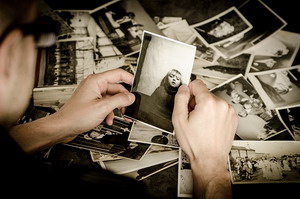 But then the next thought that came to mind was that there are over seven billion people on this planet. That is a number that we are unable to conceive of. If you counted up every person you ever met, ever saw in movies or TV, or even read about in magazines the number would only amount to a few thousand, at best maybe 10,000. That means that every memory of other humans you have seen is less than 1% of the people living in Sacramento alone. If you and everyone you ever saw disappeared tomorrow, the world would not even notice. Our entire experience of humanity is only a drop in a huge bucket of human lives. We are not significant. We are not above the real world of human experience. We pretend we are above the pain and suffering of the real world, but we are not.
But then the next thought that came to mind was that there are over seven billion people on this planet. That is a number that we are unable to conceive of. If you counted up every person you ever met, ever saw in movies or TV, or even read about in magazines the number would only amount to a few thousand, at best maybe 10,000. That means that every memory of other humans you have seen is less than 1% of the people living in Sacramento alone. If you and everyone you ever saw disappeared tomorrow, the world would not even notice. Our entire experience of humanity is only a drop in a huge bucket of human lives. We are not significant. We are not above the real world of human experience. We pretend we are above the pain and suffering of the real world, but we are not.
 Why would my mind paint such a harsh picture of reality when I am contemplating kindness? Why? – because my mind was showing me why we are not kind all the time. Kindness is for commoners, not for nobility like myself. I am special and above the possibility of unpleasant experiences caused by random chance messing with my current circumstances. I am secure, safe from harm, and safe from the unknown. I have the power to deny the unknown and create a life containing only what I prefer….. I can hear the voice of the small child I once was in the corner of my mind feeding me this story I had to believe in order to not feel terrified all the time. The story of our own significance is the cornerstone of our sanity, even though it is not true.
Why would my mind paint such a harsh picture of reality when I am contemplating kindness? Why? – because my mind was showing me why we are not kind all the time. Kindness is for commoners, not for nobility like myself. I am special and above the possibility of unpleasant experiences caused by random chance messing with my current circumstances. I am secure, safe from harm, and safe from the unknown. I have the power to deny the unknown and create a life containing only what I prefer….. I can hear the voice of the small child I once was in the corner of my mind feeding me this story I had to believe in order to not feel terrified all the time. The story of our own significance is the cornerstone of our sanity, even though it is not true.
 As we grow up and develop skills for participation with life, we are able to push away our childhood fears somewhat. We create value for ourselves through the skills we develop. This value is what we trade to get our needs met. We are no longer helplessly dependent on caretakers for our survival. Once we learn skills that others need and want, we are able to adapt our relationship to what is in a manner that serves us. Through trial and error, we learn that win-win exchanges with others work better for us in the long run than simply trying to get ahead without consideration for the needs of others. The pool of humans we live and work with is rather small, so we keep encountering the same people over and over. When we are selfish and inconsiderate, people are not inclined to participate with us. This makes getting our needs met very difficult. Reputation becomes either our ally or our enemy depending upon whether it is either positive or negative. Do people like participating with you or not?
As we grow up and develop skills for participation with life, we are able to push away our childhood fears somewhat. We create value for ourselves through the skills we develop. This value is what we trade to get our needs met. We are no longer helplessly dependent on caretakers for our survival. Once we learn skills that others need and want, we are able to adapt our relationship to what is in a manner that serves us. Through trial and error, we learn that win-win exchanges with others work better for us in the long run than simply trying to get ahead without consideration for the needs of others. The pool of humans we live and work with is rather small, so we keep encountering the same people over and over. When we are selfish and inconsiderate, people are not inclined to participate with us. This makes getting our needs met very difficult. Reputation becomes either our ally or our enemy depending upon whether it is either positive or negative. Do people like participating with you or not?
 It would be easy to see kindness as a virtue simply because many sources we trust agree that it is valuable. Phrases like “kindness is love in action” abound and lean on the assumption that you already agree with the sentiments attached to things like love. To me, this is preaching to the choir. In order to reach folks that do not focus on being kind, I have to frame it in terms that are meaningful to them – self-interest. Being kind is a virtue because it has stood the test of time as being a useful long-term stance for the good of both the individual and the larger society of humans around the individual. Kindness is a win-win proposition even though in the short run there does not appear to be any payoff. Even though kindness is expressed without any thought of return, there is a huge return in the big picture.
It would be easy to see kindness as a virtue simply because many sources we trust agree that it is valuable. Phrases like “kindness is love in action” abound and lean on the assumption that you already agree with the sentiments attached to things like love. To me, this is preaching to the choir. In order to reach folks that do not focus on being kind, I have to frame it in terms that are meaningful to them – self-interest. Being kind is a virtue because it has stood the test of time as being a useful long-term stance for the good of both the individual and the larger society of humans around the individual. Kindness is a win-win proposition even though in the short run there does not appear to be any payoff. Even though kindness is expressed without any thought of return, there is a huge return in the big picture.
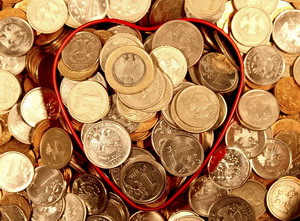 One clarification I have to make here is that kindness is not the same thing as co-dependency. On an action level, they may look similar, but they are very different on deeper levels. Kindness is given from your sense of abundance, not from a need to be loved. When you act with and from kindness, you actually feel more abundant. In co-dependency, there is a chronic state of anxiety fueled by your own unmet emotional needs. Co-dependents often need to feel in control while kindness has no such need. Kindness is a gift while co-dependents definitely hope for a return even though it rarely comes.
One clarification I have to make here is that kindness is not the same thing as co-dependency. On an action level, they may look similar, but they are very different on deeper levels. Kindness is given from your sense of abundance, not from a need to be loved. When you act with and from kindness, you actually feel more abundant. In co-dependency, there is a chronic state of anxiety fueled by your own unmet emotional needs. Co-dependents often need to feel in control while kindness has no such need. Kindness is a gift while co-dependents definitely hope for a return even though it rarely comes.
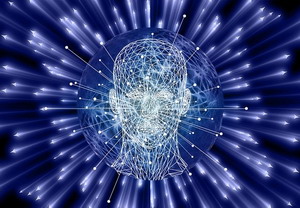 So why be kind? Kindness builds goodwill. As people like to be treated kindly, they are more likely to act kindly in return. You can not expect this and certainly not demand it, but on average you will receive more kindness by giving out kindness than you will being a stingy self-centered ass. An often unmentioned benefit to being kind is the way your brain functions while you are being kind. While acting from kindness, your stress hormones drop, your metabolism works better, and your brain power is greatly amplified. It is not that you will be more knowledgeable, but your thinking flexibility and creativity jump up. Kindness flows from a state of ease, not a state of anxiety. So many people spend so much time meditating, doing yoga, chanting, and so on in order to achieve the same state of mind that flows naturally from simply being kind.
So why be kind? Kindness builds goodwill. As people like to be treated kindly, they are more likely to act kindly in return. You can not expect this and certainly not demand it, but on average you will receive more kindness by giving out kindness than you will being a stingy self-centered ass. An often unmentioned benefit to being kind is the way your brain functions while you are being kind. While acting from kindness, your stress hormones drop, your metabolism works better, and your brain power is greatly amplified. It is not that you will be more knowledgeable, but your thinking flexibility and creativity jump up. Kindness flows from a state of ease, not a state of anxiety. So many people spend so much time meditating, doing yoga, chanting, and so on in order to achieve the same state of mind that flows naturally from simply being kind.
 So being kind helps you physically, emotionally, mentally, and socially. Kindness builds a circle of trust around you as people come to enjoy participating with you. This aids your financial well-being by providing opportunities that would otherwise not be offered to you. Being kind is a type of magic that you can invite into your life if you choose. What does kindness look like in action? Here is a lovely webpage I found on that very topic. What Is Kindness? | Kindness Is Everything
So being kind helps you physically, emotionally, mentally, and socially. Kindness builds a circle of trust around you as people come to enjoy participating with you. This aids your financial well-being by providing opportunities that would otherwise not be offered to you. Being kind is a type of magic that you can invite into your life if you choose. What does kindness look like in action? Here is a lovely webpage I found on that very topic. What Is Kindness? | Kindness Is Everything
Enjoy,
David
